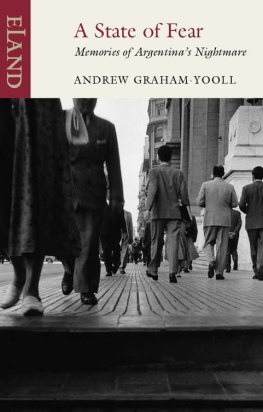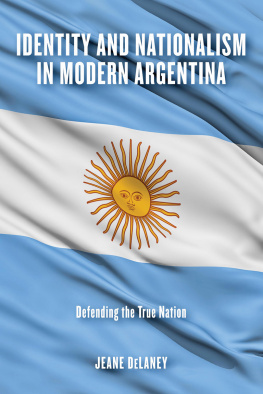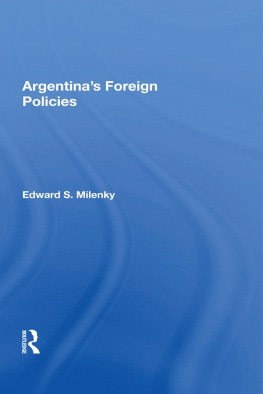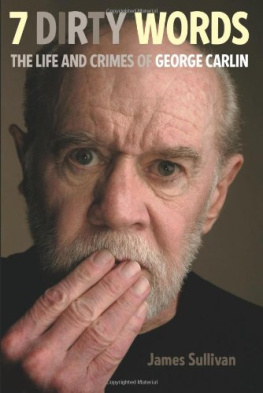ARGENTINAS MISSING BONES
VIOLENCE IN LATIN AMERICAN HISTORY
Edited by Pablo Piccato, Federico Finchelstein, and Paul Gillingham
Uruguay, 1968: Student Activism from Global Counterculture to Molotov Cocktails, by Vania Markarian
While the City Sleeps: A History of Pistoleros, Policemen, and the Crime Beat in Buenos Aires before Pern, by Lila Caimari
Forgotten Peace: Reform, Violence, and the Making of Contemporary Colombia, by Robert A. Karl
A History of Infamy: Crime, Truth, and Justice in Mexico, by Pablo Piccato
Death in the City: Suicide and the Social Imaginary in Modern Mexico, by Kathryn A. Sloan
Argentinas Missing Bones: Revisiting the History of the Dirty War, by James P. Brennan
ARGENTINAS MISSING BONES
Revisiting the History of the Dirty War

James P. Brennan
Photographs by Mercedes Ferreyra

UNIVERSITY OF CALIFORNIA PRESS
University of California Press, one of the most distinguished university presses in the United States, enriches lives around the world by advancing scholarship in the humanities, social sciences, and natural sciences. Its activities are supported by the UC Press Foundation and by philanthropic contributions from individuals and institutions. For more information, visit www.ucpress.edu.
University of California Press
Oakland, California
2018 by James P. Brennan
Library of Congress Cataloging-in-Publication Data
Names: Brennan, James P., 1955 author. | Ferreyra, Mercedes, photographer.
Title: Argentinas missing bones : revisiting the history of the dirty war / James P. Brennan; photographs by Mercedes Ferreyra.
Description: Oakland, California : University of California Press, [2018] | Series: Violence in Latin American history ; 6 | Includes bibliographical references and index. |
Identifiers: LCCN 2017050752 (print) | LCCN 2017052779 (ebook) | ISBN 9780520970076 (ebook) | ISBN 9780520297913 (cloth : alk. paper) | ISBN 9780520297937 (pbk. : alk. paper)
Subjects: LCSH : ArgentinaHistoryDirty War, 19761983. | Crdoba (Argentina)History20th centuryCase studies. | Trials (Crimes against humanity)Argentina.
Classification: LCC F 2849.2 (ebook) | LCC F 2849.2 .B743 2018 (print) | DDC 982dc23
LC record available at https://lccn.loc.gov/2017050752
Manufactured in the United States of America
26 25 24 23 22 21 20 19 18
10 9 8 7 6 5 4 3 2 1
For Crdobas disappeared and their families
Contents
Acknowledgments
Sometimes books are the result of an opportunity. The changes in human rights policies under the government of Nestor and Cristina Kirchner (20032015) made feasible undertaking serious historical research on the state terrorism of Argentinas last military dictatorship. Previously, the obstacles were daunting. The systematic destruction of the militarys records on its conduct during the so-called dirty war, an attempted erasure of all incriminating evidence, seemed to preclude research beyond oral histories, most notably those of the victims. The Kirchners revived the human rights issue and made it a central component of a governing strategy, repealing the previous amnesty laws, resuming trials and on an unprecedented scale of those accused of crimes during the dictatorship, establishing monuments and memory sites to memorialize its victims, even assembling archives for purposes of litigation if not historical research. I could not have written this book without these fortuitous changes.
Beyond favorable circumstances in Argentina, I have benefited from the support of various institutions and individuals. A research fellowship from the National Endowment for the Humanities permitted a year of research (20102011) in Argentina and a visiting fellowship the following year at the Woodrow Wilson International Center for Scholars in Washington, DC, allowed some additional research and preliminary writing on the subject. I am grateful to the staff at the latter and especially the director of the Latin America program there, Cynthia Arnson, for their support and for creating such a stimulating environment to share my research and learn from that of other fellows. In Argentina, my debts are many but I would like to thank especially the staff of the Archivo Provincial de la Memoria in Crdoba for their efforts to assist me in multiple research visits to the archive at a time of enormous activity for them with the trials and the human rights issue generally in the city. Despite hectic schedules and multiple demands on their resources, they found time to answer my questions and search for materials, and accommodated me with a working space as well as facilitated contacts in the local human rights movement. The staffs at the two sitios de memoria in Crdoba, La Perla, and the Campo de la Ribera likewise were generous with their time, and my multiple visits to both former detention centers informed in a very personal way my interpretation of the crimes committed there. In California, the interlibrary loan staff of Toms Rivera Library at UC Riverside patiently and efficiently handled my repeated requests for materials. To all, I am deeply grateful.
My greatest debt is to the many individuals who in diverse and crucial ways contributed to this project. Daro Olmo, the former head of the Equipo Argentino de Antropologa Forense and at the time of this research the undersecretary for human rights in Crdoba, made available to me the forensic teams reports and offered his personal assessment on the peculiar conditions that existed in Crdoba during the dictatorship. Juan Martn Zanotti and Agostina Parisi were eager and tenacious research assistants. Mercedes Ferreyra provided the books photographs, which offer remarkable and instructive images not easily conveyed by mere words. Bill Nelson provided the cartography expertise for the city map of Crdoba. The manuscript was read and I received excellent criticisms from John Bawden, Federico Finkelstein, Mark Healey, and David Pion-Berlin, which greatly improved the book. A talk at the University of Chicagos Latin American history workshop likewise offered an opportunity to present some of the preliminary conclusions that I had reached and to receive excellent feedback from faculty and a group of very able graduate students. In Argentina, Ral Garca Heras, Mnica Gordillo, Vicente Palermo, Marcelo Rougier, Carol Solis, and Juan Carlos Torre all encouraged me to write this book and offered helpful advice along the way.
I owe a very great debt to Fernando Reati. By sheer chance I was in the courtroom in 2010 when Fernando gave his gripping, detailed testimony of his incarceration and torments in the UP1 penitentiary. In the afternoon proceedings, an empty seat beside me was occupied just as another witness was to begin his testimony. It was Fernando who sat next to me. We struck up a conversation about his testimony and the trial and since then have maintained a correspondence. Fernando read the manuscript with great care, offered trenchant criticisms, but not so harsh as to discourage me from publishing. Fernando most likely will not agree with all my arguments in the book, but I do hope he agrees with most of them. A chance encounter with him at the 2010 UP1 trials allowed me to make a friend of someone whose personal history in these terrible events served to deepen my understanding of the human cost of the militarys crimes.
My wife, Olga Ventura, and daughter, Nadine Brennan, became almost as engrossed in this history over the past seven years as I have been. They pored over the numbers with me of the thousand-plus victims of the state terrorism in Crdoba, and helped me track down the dates and sites of their abductions and uncover the precise circumstances of their fates. In the process we all became more than familiar with many of the victims, and felt a personal bond with them and a moral responsibility to get this history right. Hopefully, we have succeeded.
Next page









